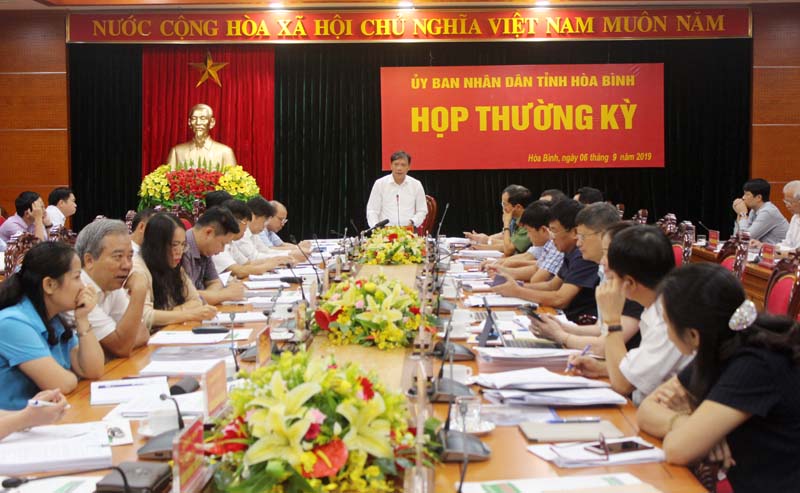
(HBO) – The Hoa Binh People’s Committee convened a regular meeting for September to discuss important issues on local socio-economic development. The function was presided over by Vice Secretary of the provincial Party Committee and Chairman of the provincial People’s Committee Bui Van Khanh.
Vice Secretary of the provincial Party Committee and Chairman
of the provincial People’s Committee Bui Van Khanh concludes the meeting.
While deliberating the draft report and
resolution on the local five-year medium-term public investment plan for
2016-2020, participants agreed to supplement two foreign-invested projects
worth over 86.3 billion VND, namely the one supplying medical equipment for the
General Hospital of Lac Thuy district and the other for developing tourism
infrastructure for inclusive growth in the Greater Mekong Subregion (GMS) in
the second phrase – the sub-project pn building and upgrading tourism
infrastructure at the relic site of Tien Pagoda in Phu Lao commune, Lac Thuy
district.
Delegates also agreed to add two projects to the
local medium-term public investment plan, which are building Road 445 for Hai
Cao hamlet, Hop Thinh commune (Ky Son district) with an estimated total
investment of 60 billion VND and providing medical equipment for the General
Hospital of Lac Thuy district with a total investment of over 77.5 billion VND.
As of September 30, the province collected over
2.3 trillion VND to the State budget, fulfilling 77 percent of the Prime
Minister’s projection and 62 percent of the target set by the provincial
People’s Council, up 4 percent compared to the same period of 2018.
The province aims to collect 4 trillion VND to
the State budget by the year’s end and 5 trillion VND by 2020.
At the meeting, delegates raised opinions on
important documents on promoting the investment policy for commercial housing
projects in the province, supporting sustainable forestry development in
2020-2025 with orientations to 2035, and developing agriculture through 2025.
Chairman of the provincial People’s Committee
Bui Van Khanh asked relevant agencies and localities to make it easier for
investors to carry out projects to boost socio-economic development, generate
jobs, and increase budget collection for the province./.
The Standing Board of the Hoa Binh provincial Party Committee has agreed in principle on a proposal by the Standing Board of the Party Committee of Hoa Binh city to gather feedback on the city’s 1:2000 zoning plan, which forms part of its broader urban development strategy.
Hoa Binh province has made notable progress in public administration reform and digital government development, with the satisfaction index among citizens and businesses reaching over 84%, according to recent government evaluations.
Thanks to great efforts by local authorities in recent times, the governance and public administration performance of Mai Chau district has been significantly improved.
In the afternoon of June 6, the Party Committee, the People's Council, the People's Committee and the Fatherland Front of Lac Son district solemnly held a meeting to celebrate the 139th anniversary of the district's founding (1886–2025) and the 79th anniversary of the establishment of the district's Party Committee (1946–2025). There was the attendance of Mr. Bui Van Thang, the Vice Chairman of the Provincial People's Council; Mr. Quach Tat Liem, the Vice Chairman of the Provincial People's Committee; Ms. Dang Bich Ngoc, the Deputy Head of the National Assembly Delegation of the province; as well as the former leaders of the province and district through various periods, who are the natives of the district.
Implementing the Politburo’s Resolution No. 57-NQ/TW on breakthroughs in science – technology, innovation, and digital transformation is a golden opportunity for the northern mountainous province of Hoa Binh to renew growth model, improve competitive edge and shorten digital gap.
Resolution 57-NQ/TW, issued by the Politburo on December 22, 2024, identifies sci-tech, innovation, and digital transformation as strategic breakthroughs to build a developed and prosperous nation. In Hoa Binh province, this spirit is not just a slogan, it’s being put into action through concrete initiatives that form a "new development triangle”: digital citizenship, digital economy, and digital administration.



